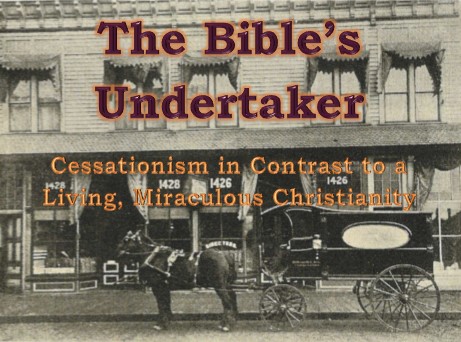The Bible’s Undertaker: Cessationism in Contrast to a Living, Miraculous Christianity

Introduction
Twentieth century Pentecostalism reawakened the world to miracles. The growth of this movement activated individuals in established religion to wrestle with a major player on the world scene of Christianity. Even so, as Pentecostalism expands, the cessationist view resuscitates a theological position that corresponds with the European intellectual development of the late seventeenth and eighteenth centuries named the Enlightenment. The proponents of cessationism believe that their cause is true and just. As a consequence of the strict emphasis on Enlightenment presuppositions in theology, their belief system allows no place for the miraculous in Christian living. The thesis of this paper argues for the clear biblical authority and support for miracles in contrast to the problem of the unbiblical history of cessationism. The topic is divided into five sections. First, a presentation of the problem of cessationism and the purpose of this study is submitted. Second, specific historical figures from church history represent the foundation for cessationism. Third, historical antecedents supporting miraculous experiences are surveyed. Fourth, a theological and biblical critique of cessationism is examined. Fifth, concluding thoughts and reflections on the unbiblical basis for cessationism is contested by the biblical revelation of the miraculous in Christianity.
The problem and study
As a consequence of the strict emphasis on Enlightenment presuppositions in theology, cessationists’ belief system allows no place for the miraculous in Christian living.
The purpose of this paper exegetes the faulty presuppositions underlying cessationist opinion. This study examines the historical ethos behind cessationism and buttresses the biblical belief in the miraculous with Holy Scripture. In fact, the modern day cessationist view is not grounded in Scripture but rather in the principles of the Enlightenment, which support the secular American culture. An honest evaluation of cessationism would cause many conservative fundamentalists to reconsider the underpinnings of their belief system.
Notable persons from church history supporting cessationism
Specific historical antecedents for the unbiblical belief in cessationism are copious. Numerous Christians holding a cessationist theology have contributed to this investigation. This section discusses the remarks of five particular people: John Chrysostom, Augustine, John Calvin, B.B. Warfield and John MacArthur. Their outspoken influence creates a thread of unbelief and skepticism enduring two millennia of Christianity.
Category: Spirit, Summer 2015


